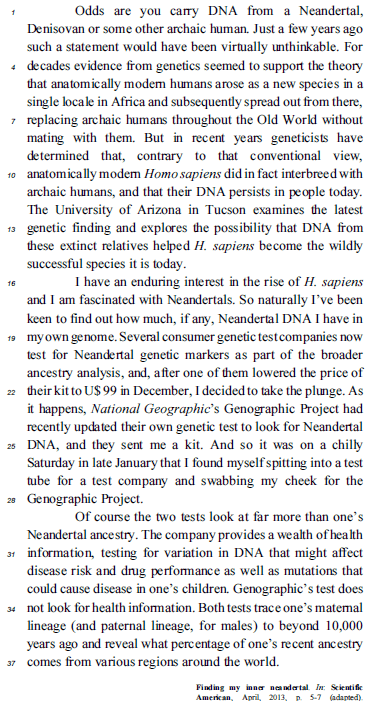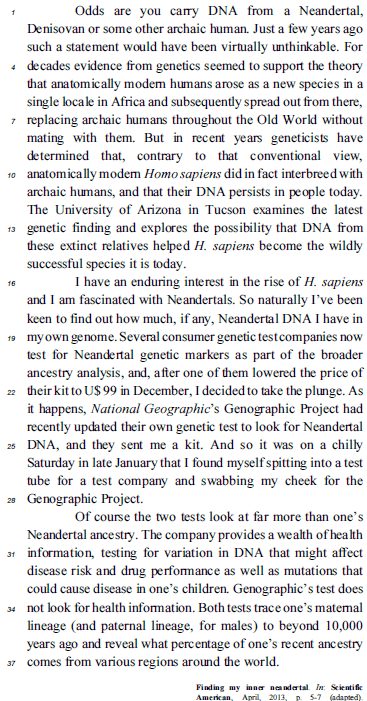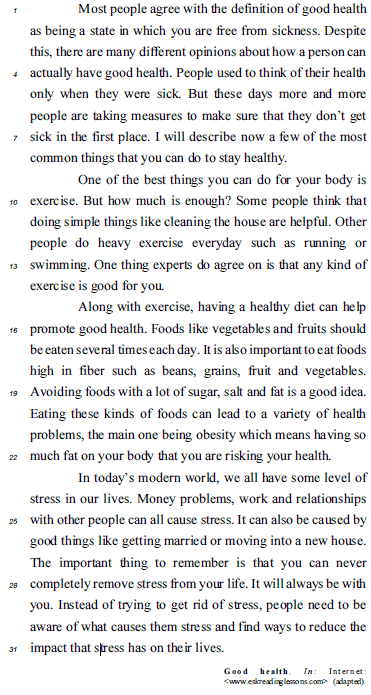Questões sobre Gramática
Lista completa de Questões sobre Gramática para resolução totalmente grátis. Selecione os assuntos no filtro de questões e comece a resolver exercícios.
A sentença Jane _____ cook pasta very well. é CORRETAMENTE completada com
- A. can
- B. dont
- C. is
- D. would have
Leia as sentenças abaixo:
I. The waiter that served me at the coffe shop moved away.
II. He saw that the bottles were empty.
III. Carla told me that she was going to quit the restaurant where she works in.
IV. I didnt get the job that I applied for.
Em qual (is) das sentenças acima o uso do pronome relativo em negrito é extremamente necessário?
- A. I.
- B. I, IV.
- C. II, IV.
- D. III, IV.
Assinale a alternativa que apresenta os termos que preenchem CORRETAMENTE as lacunas existentes nos enunciados seguintes, de cima para baixo:
I. These bees ___________ kept in a large hive before they were taken out and examined by the beekeeper.
II. A thief came into his house, tied him up, took his money, and left. He ___________ tied up for several hours.
III. John doesn't cook very well. He _____________ helped by his wife.
IV. Amanda is pregnant. She expects her baby ______________ in November.
- A. are - has been - was - been born
- B. had been - has been - was being - to be born
- C. had been - was - had been - was born
- D. has been - had been - had being - to be born
Levando em consideração as diferentes formas de se referir a ações no futuro, analise os itens seguintes:
I. Claire is working at the library on Friday morning.
II. When I retire, I am going to go back to Liverpool to live.
III. The telephone is ringing, but I wont answer it.
IV. James and Sarah are working two jobs to afford a private school for their children.
O emprego dos termos em destaque está CORRETO apenas em
- A. I.
- B. III e IV.
- C. I, II e III.
- D. I, II, III e IV.

Judge the items that follow based on the text above.
The verb form did in the fragment Homo sapiens did in fact interbreed with archaic humans (l.10 and 11) was used to express an indirect question.- C. Certo
- E. Errado
 De acordo com o texto acima, as expressões destacadas for, every once in a while e yet podem ser substituídas, sem prejuízo de sentido, respectivamente, por
De acordo com o texto acima, as expressões destacadas for, every once in a while e yet podem ser substituídas, sem prejuízo de sentido, respectivamente, por
- A. because, sometimes, but.
- B. of, everytime, however.
- C. so, then, despite.
- D. to, sometimes, however.
Leia o diálogo abaixo:.
Douglas: Its good to have you here, cousin! Would you like some wine? Claudia: Sure. Douglas, remember when we were kids and we used to visit grandma every Sunday for lunch? Douglas: Yes. We would spend the whole day playing in the backyard! Too bad we cant turn back time Claudia: Youre right I guess I would have spent more time with her. She used to take such good care of us. She would make us those delicious chocolate chip cookies, then she would buy us all Christmas presents.!
She has always enjoyed being around her grandchildren!
Douglas: Yeah If I had grandchildren, I would be exactly like she was to us.
Claudia: So would I! I would rather be like her than being a lonely old lady.
De acordo com o diálogo acima, nas expressões destacadas, o verbo modal would é empregado para indicar, respectivamente,
- A. interesse; condição passada; hábito passado; hipótese; preferência.
- B. interesse; hábito passado; condição; situação futura; habilidade passada.
- C. preferência; fato passado; hipótese; planos futuros; interesse.
- D. preferência; hipótese passada; hipótese; interesse; condição futura.

Judge the items that follow based on the text above.
if any (l.18) refers to the possibility that there is no Neandertal DNA in the authors genome at all.- C. Certo
- E. Errado
Assinale a alternativa que preencha CORRETAMENTE as sentenças abaixo de acordo com os verbos dados, respectivamente.
I. _________________ (to lie) in the sun for six hours. Thats why he is sunburnt.
II. Carry is on the phone now. _________________ (to talk) to her sister in Greece.
III. Im not sure if this is a good book. _________________ (to read) it.
IV. I think Im a good skier. _________________ (to go skiing) every weekend in the winter.
V. In Middle East the people _________________ (to rise up) against the dictator after the incident.
VI. Americans _________________ (to be) the first to send a man to the moon about fifty years ago.
- A. He laid - She talks - I hasnt read - Im going skiing - rised up - will be
- B. He lied - Shes talking - I didnt read - Im going to go skiing - have been rising up - are
- C. Hes been lying - Shes talking - I havent read - I go skiing - rose up - were
- D. Hes lying - She used to talk - Im reading - Im going to ski - raised up - have been

Based on the text above, judge the following items.
The expression Along with exercise (l.15) can be correctly replaced with As well as exercising.- C. Certo
- E. Errado


